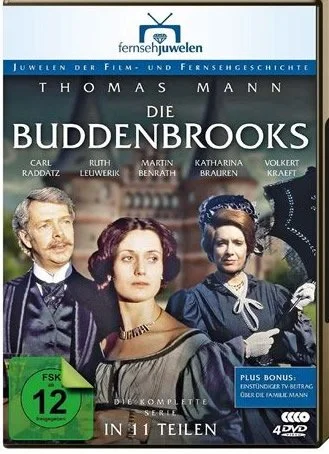- Activism
- Animation
- Asylum
- Austria
- Berlin
- Black Germans
- Childhood
- Cologne
- Colonialism
- Comedy
- DDR
- Documentary
- East/West Germany
- Environment
- Food
- Hamburg
- Health
- Holocaust
- Immigration
- Intergenerational Families
- Jewish
- Judicial system
- Lesbian/Gay
- Lübeck
- Munich
- National Socialism
- Politics
- Pomerania
- Racism
- Religion
- Sexism
- Short films
- Stuttgart
- Switzerland
- Twins
- Weimar Republic
Thomas Mann: Die Buddenbrooks
Buddenbrooks is a 1901 novel by Thomas Mann, chronicling the decline of a wealthy north German merchant family over the course of four generations, incidentally portraying the manner of life and mores of the Hanseatic bourgeoisie in the years from 1835 to 1877. Mann drew deeply from the history of his own family, the Mann family of Lübeck, and their milieu. It was Mann’s first novel, published when he was 26 years old. With the publication of the second edition in 1903, Buddenbrooks became a major literary success. Its English translation by Helen Tracy Lowe-Porter was published in 1924. The work led to a Nobel Prize in Literature for Mann in 1929; although the Nobel award generally recognises an author’s body of work, the Swedish Academy's citation for Mann identified “his great novel Buddenbrooks” as the principal reason for his prize.
Die Manns: Ein Jahrhundertroman
This epic documentary/drama about arguably the greatest German author of the 20th century is really fascinating. Watching Elisabeth Mann-Borgese return to the places of her childhood is quite a moving experience and you feel the wisdom and the experience this old lady can share with the world. And it is a great gift for all of us that she did so shortly before her death. What a great family story this is! Everybody does a tremendous job in acting their roles…. This mixture of historical movie and documentary is just about perfect and may establish a new genre.


